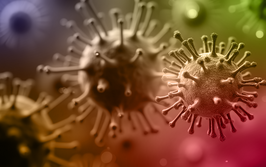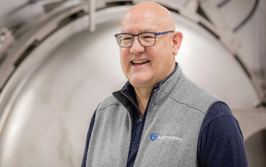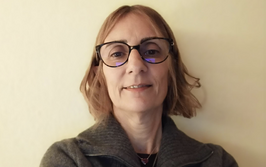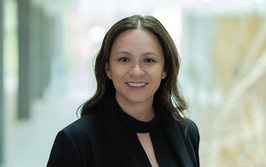Leading with the Heart
AskBio CEO Sheila Mikhail shares the story behind her success and her strength
| 6 min read | Interview

It has been said many times that we should never forget what or where we’ve come from. Back in June, we sat down with AskBio CEO and Co-Founder Sheila Mikhail, who continues to leverage her success for the benefit of those at her roots, those she meets on the way, those she inspires, and those she is inspired by – despite her own personal challenges. Now acting in the capacity of advisor, Mikhail spends her time focussing on the challenge of battling cancer, and raising awareness of ongoing inequality for women in cancer screening and diagnosis. Here she shares how to steer companies, employees, and herself through challenging times.
How did you keep employees motivated during difficult times?
We kept the focus on the patients and our mission. I always liked to tell our employees that we were revolutionaries changing the way that medicine is being practiced! Instead of treating the symptomology, we were trying to figure out what is causing the disease at the molecular level. From there, you can go in and fix it. I am still a firm believer that this is the future of medicine. Nobody benefits by just treating the symptoms, but if we can tweak whatever is wrong at the molecular level, and do that effectively and precisely, then the quality of life change will be amazing. We would be giving people back their lives, and giving children their childhood.
How important is it to have the right people around you in difficult situations?
It's incredibly important. Being a CEO is a very lonely place, and sometimes you're very uncertain about if you can achieve things, but you always have to project confidence, even at your lowest point. You don't want a bunch of yes people around you. You want people to challenge you and to help shape your ideas.
I love people who are committed and who work passionately. It's so much fun to work with people who are trying to do breakthrough science and genuinely achieve something new. Those people are dynamic and incredible. When you reach for the stars, maybe you won't get that far, but you'll get a lot further than if you set the expectations low. I've been very fortunate to have worked with people who are pioneers in their fields; people with big vision and who have stretched and pushed me to get gene therapies into the clinic for pathway diseases.
How important is it for CEOs to juxtapose altruism and philanthropy with business?
It is extremely important. Jude Samulski was approached by parents from all over the world who had kids with ultra rare diseases. It is very difficult for these patients and their parents to get attention from anyone in the for-profit sector. We find that our technology at AskBio works extremely well for many of these diseases with single-gene defects. If you can just replace the defective gene with a therapeutic gene, it works extremely well.
We believed that these children should not be left behind. Although we couldn't make the business case, we formed a non-profit, Columbus Children's Foundation (CCF), to focus on developing gene therapies for children with ultra rare disease. We focused first on amino acid decarboxylase deficiency, which is an incredibly devastating neurological disease where children essentially end up strapped into a chair. They can't lift their heads. They can't talk, or use their hands, or feed themselves. They were treated with our therapeutic and, a year later, they are talking, walking, and feeding themselves. I have videos of kids skiing, dancing, and going to school. I've met some of these kids and it really makes you realize that every life is valuable.
But when you look at the numbers, you can't make a business case to go after that disease. It's really unfortunate because you're refusing to help because of an inadequate return on investment. I've seen how devastating disease impacts families. It's very stressful. We shouldn't think in macro, and dehumanize what we're doing. We have to think about everyone’s potential. They are on this Earth and if we can make their quality of life better and allow them to make their contributions, then it is extremely valuable. If you’re in possession of a technology that can make the blind see and make the deaf hear, you have an obligation to unleash that technology.
How did your career change earlier this year?
I stepped down as CEO of AskBio earlier this year because I was diagnosed with bilateral breast cancer. I was very surprised because I went for mammograms every year. They missed two sizable tumors. I’ve had a lot to learn. I’ve been working to understand why a very reputable institution (Duke University) missed the tumors, and I’ve been learning about cancer and cancer treatment as I navigate the options that I have. I’ve learned a lot about the flaws of breast cancer screening and I have spent my time educating other women by working with the legislature in North Carolina, and at the federal level, to pass laws that mandate insurance coverage or supplemental screening because, unfortunately, in my case (and many other cases), the doctors follow insurance coverage as the standard of care rather than looking at the patient's needs. Convincing insurance companies to expand coverage is not easy.
My tumors were found in time, so I have pretty good outcomes, but the whole process has been enlightening. I had to fight to get the proper screening and I was told that my insurance wouldn’t cover it when I pushed for a chest CT.
Now I'm advocating for women because if I had to struggle this hard to get diagnosed, then God help other women. This is an example of equitable access. I'm doing my part to try to make changes in talking to and educating women, but it's always about insurance. You can cure disease by giving women the right screening tool for their breast type.
I’ve been trying to make something good from my experience and help others. Everything happens for a reason. I was the first in my family to go to college and I've always been driven by all the opportunities that came my way, as well as how I can help others along the way. A lot of people are not so fortunate. I have a big voice; I have opportunities, and I have resources, so I will apply those where I can to help others.
What are your hopes and expectations for the future of advanced medicine?
I'd like to see more diseases treated at the molecular level rather than just treating symptomology. Gene and cell therapy has it right: fix, rather than ameliorate, the problem.
I’d like to see more preventative measures using cell and gene therapy to prevent disease from occurring. It’s also important to broaden access and affordability by driving down the manufacturing costs. I want to make sure people around the world get what they need. Part of this challenge is about having compassion. It cannot always be about return on investment.
When you lead with your heart, good things happen. I always tell people not to think about returns as return on money invested. Instead, think about the number of lives positively impacted. Guess what? It’s a pretty good measure for both buyers and for returns.



















